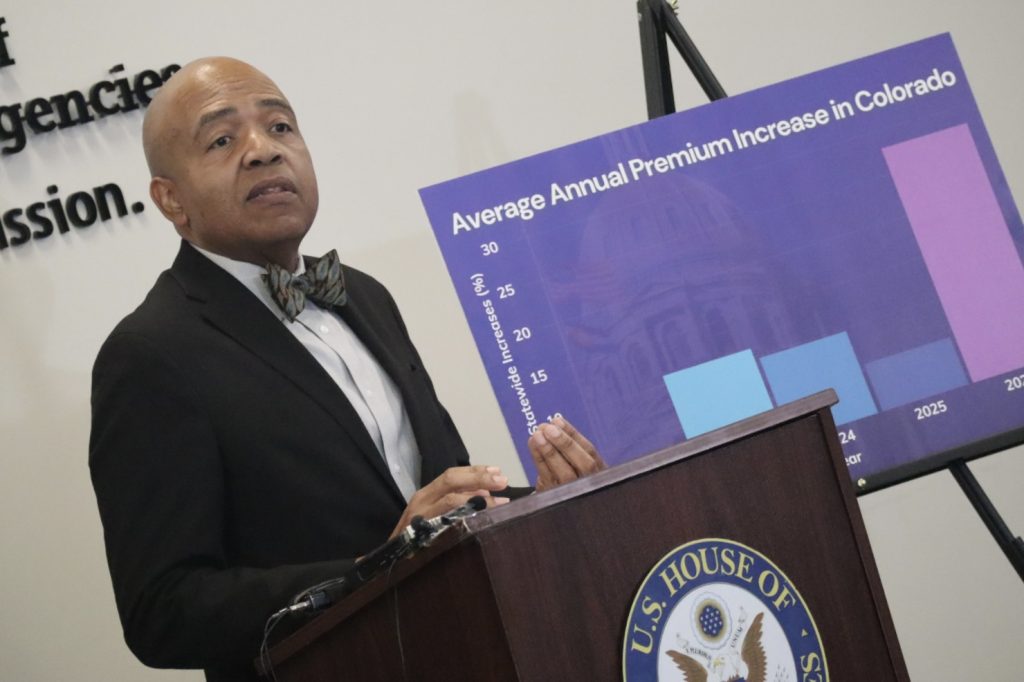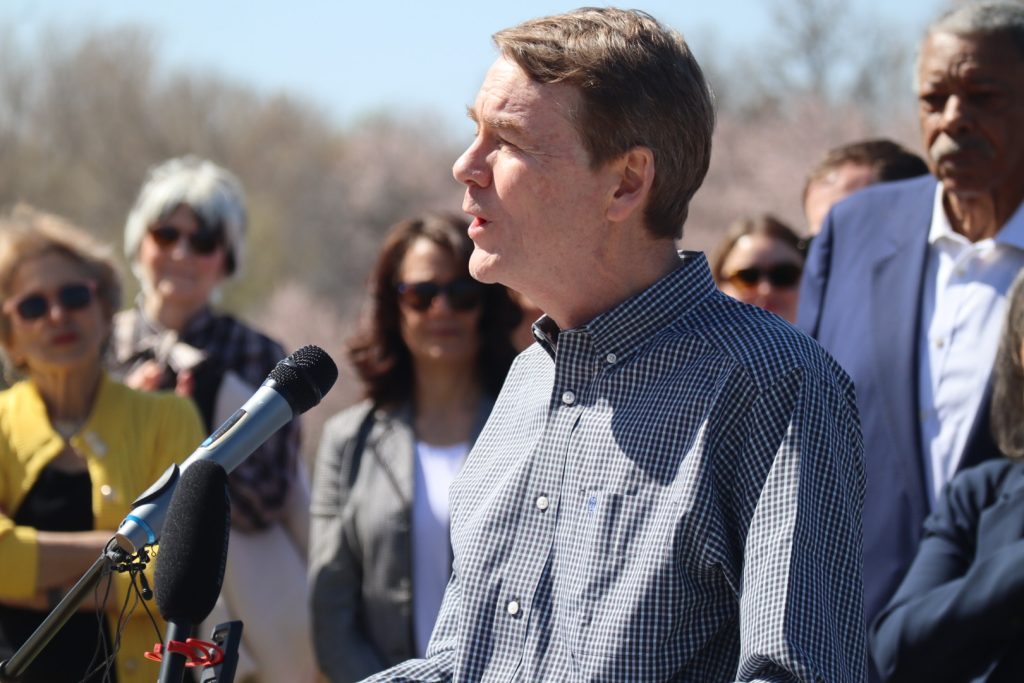U.S. Rep. Jeff Hurd introduces bill to renew health insurance subsidies for 2 years, extend open enrollment period
Description
U.S. Rep. Jeff Hurd, a Republican congressman from Colorado, is sponsoring new legislation to extend soon-to-expire health care subsidies for two years and give people who shop for their health insurance more time to enroll.
Hurd is sponsoring the measure, dubbed the Bipartisan Healthcare Optimization, Protection, and Extension — or HOPE — Act, alongside Reps. Don Bacon, R-Nebraska, Tom Suozzi, D-New York, and Josh Gottheimer, D-New Jersey.
The bill is the latest attempt by Hurd and other federal lawmakers to ward off skyrocketing health insurance rates next year due to expiring Affordable Care Act subsidies. Known as the enhanced premium tax credit, the subsidies were first passed under Democrats in 2021 and renewed in 2022, and are now slated to lapse on Dec. 31.
If those subsidies expire, insurance premiums on the state’s individual marketplace, Connect for Health Colorado, are expected to double on average next year for 225,000 Coloradans. On the Western Slope, where health care costs are already higher, some residents are seeing premium increases of over 400%.
“Families across Colorado are already stretched thin by high health care costs, and without action from Congress, premiums are set to rise sharply at the end of this year,” said Hurd, whose district spans much of western and southern Colorado, in a statement. “I joined this bipartisan effort because doing nothing would leave too many families in rural communities facing unaffordable increases that they cannot absorb.”
Along with extending the premium subsidies, Hurd’s bill would push the end of the open enrollment period from Jan. 15 to May 15, giving Coloradans an additional four months to choose their coverage plans.
Open enrollment has been ongoing since Nov. 1, but some would-be enrollees may not have selected plans due to higher costs. Officials for Connect for Health Colorado and the state’s insurance division have said there’s still time for Congress to renew the enhanced tax credits during the open enrollment period, though implementing those subsidies could be tricky.
<figure class="wp-block-image size-large">
 <figcaption class="wp-element-caption">Connect for Health Colorado CEO Kevin Patterson discusses rising health insurance costs during a news conference with reporters in Denver on Oct. 20, 2025. Patterson said it’s “not too late” for Congress to extend insurance subsidies.</figcaption><figcaption>Robert Tann/Summit Daily News</figcaption>
<figcaption class="wp-element-caption">Connect for Health Colorado CEO Kevin Patterson discusses rising health insurance costs during a news conference with reporters in Denver on Oct. 20, 2025. Patterson said it’s “not too late” for Congress to extend insurance subsidies.</figcaption><figcaption>Robert Tann/Summit Daily News</figcaption>Hurd’s bill also includes new income caps on the subsidies and measures to reduce fraud.
While the tax credits currently do not have an income cap — eligibility is based on how much a household’s income is spent on premiums — Hurd’s bill would phase out the benefit based on earnings.
A family of four earning less than $200,000, for example, would qualify for the full tax credit, and the subsidies would be phased out for families earning between $200,000 and $300,000. Households of four earning over $300,000 would no longer qualify for the subsidy.
The bill implements guardrails against fraud and “ghost beneficiaries” by requiring Affordable Care Act marketplaces to check death records and developing a standard of proof to determine when an insurance agent or broker should be allowed to continue operating on the marketplace. The bill also requires marketplaces to more clearly notify recipients about the value of tax credits they are receiving.
The HOPE Act is Hurd’s second attempt at corralling legislative support around a subsidy extension this year. In September, he introduced a bill alongside many of the same lawmakers that would have extended the tax credits for one year. He later unveiled a revamped proposal that included a two-year subsidy and introduced that legislation late last week.
The subsidy issue was at the heart of the federal government shutdown that ended earlier this month, with most Democrats refusing to vote for Republicans’ government funding bill because it did not include an extension of the subsidies.
The 43-day shutdown — the longest in U.S. history — ended on Nov. 12 without a renewal of the enhanced tax credits. To help win over enough Democrats to end the shutdown, Senate Majority Leader John Thune, a South Dakota Republican, promised to hold a standalone vote in December on extending the subsidies.
Sen. Michael Bennet, in a recent press briefing with reporters, said he’s pessimistic about that vote and doesn’t believe there will be enough support from Republicans for an extension. Republicans previously voted down an amendment to the funding bill that would’ve extended the tax credits for one year. The vote was 53-47 along party lines.
“I don’t expect any Republicans in the Senate to change their vote, and I don’t expect the House to try to pass that bill,” Bennet said. “We could end up being surprised by that, but I wouldn’t hold out hope for that.”
<figure class="wp-block-image size-large">
 <figcaption class="wp-element-caption">U.S. Sen. Michael Bennet, D-Colorado, speaks to supporters in downtown Denver on April 11, 2025. Bennet said he was “deeply disappointed” in the agreement struck between Senate Republicans and other Democrats that reopened the government without an extension of Affordable Care Act subsidies. </figcaption><figcaption>Robert Tann/Summit Daily News</figcaption>
<figcaption class="wp-element-caption">U.S. Sen. Michael Bennet, D-Colorado, speaks to supporters in downtown Denver on April 11, 2025. Bennet said he was “deeply disappointed” in the agreement struck between Senate Republicans and other Democrats that reopened the government without an extension of Affordable Care Act subsidies. </figcaption><figcaption>Robert Tann/Summit Daily News</figcaption>Republican House Speaker Mike Johnson has not committed to bringing the subsidy issue to a vote. Republicans hold majorities in both chambers of Congress.
Some Republican lawmakers are floating other ideas for how to lower health insurance costs next year. That includes proposals to send money directly to consumers’ health savings accounts to help pay for other expenses. Democrats have criticized that plan, saying it would not do as much to reduce health care costs as the premium tax credits would.
Many Republicans are also opposed to continuing any subsidies for the Affordable Care Act, which they continue to criticize for not reducing overall health care costs, and would instead like to repeal it.
It’s also unclear where President Donald Trump stands on the issue. Trump held off on negotiating with Democrats to extend the subsidies during the shutdown and recently endorsed sending direct money to consumers rather than a tax credit. But he is also reportedly open to extending the tax credits, though Trump has not made a final decision.
Hurd said he wants a temporary extension of the subsidies to give Congress time to work out a long-term solution to rising health care costs. He previously listed the cost of prescription drugs and administrative and regulatory burdens as areas where he’d focus on reforms.
In his statement, Hurd called the bipartisan bill he has with other lawmakers a “practical, bipartisan solution that maintains affordability, enhances transparency, and improves accountability.”




